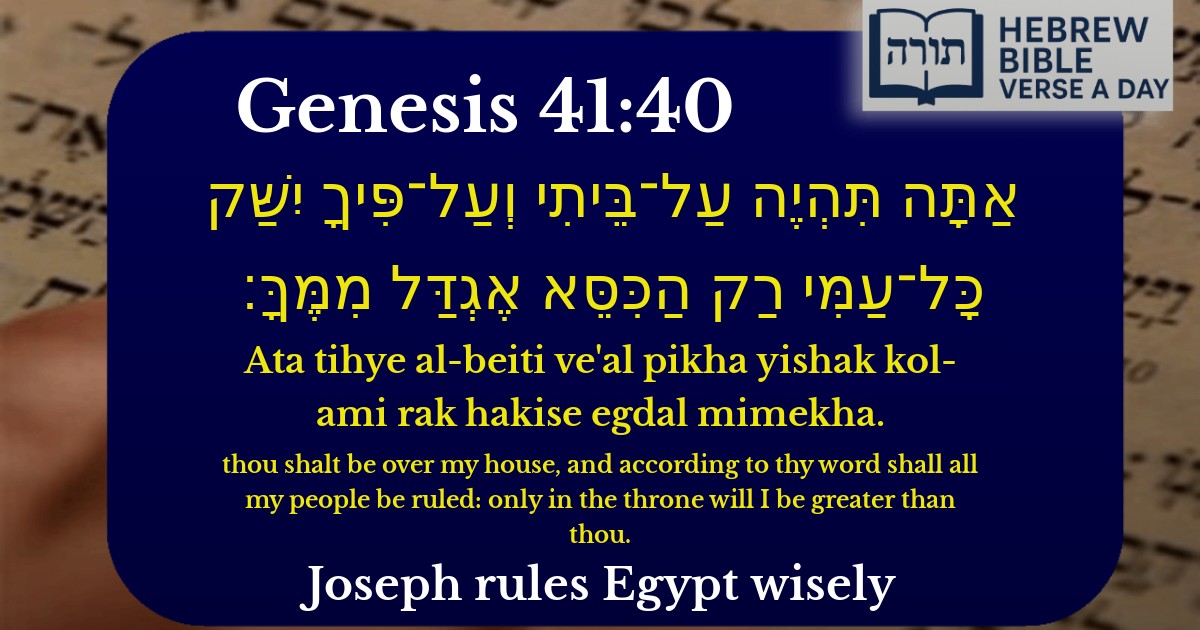Frequently Asked Questions
Q: What does Genesis 41:40 mean when Pharaoh says 'only in the throne will I be greater than thou'?
A: Pharaoh is appointing Yosef (Joseph) as his second-in-command, giving him authority over all of Egypt, but clarifying that Pharaoh himself remains the ultimate king. Rashi explains that this means Yosef would have nearly royal authority, but Pharaoh would still sit on the actual throne as the supreme ruler.
Q: Why is Genesis 41:40 important in the story of Yosef (Joseph)?
A: This verse marks the dramatic turning point where Yosef rises from being a prisoner to becoming the viceroy of Egypt. The Ramban notes that this fulfills Yosef's earlier dreams of leadership (Genesis 37), showing how Hashem's plan unfolds even through difficult circumstances.
Q: What can we learn from Pharaoh's appointment of Yosef in Genesis 41:40?
A: The Midrash teaches that this shows how Hashem elevates the righteous at the proper time. Despite Yosef's years of suffering, his wisdom and integrity ultimately led to this great position. It teaches us about patience, maintaining faith during challenges, and how divine providence works in unexpected ways.
Q: How does the phrase 'according to thy word shall all my people be ruled' apply to leadership?
A: The Talmud (Pesachim 87b) derives from this that a righteous leader's words should be respected like royal decrees. Yosef earned this authority through his wisdom and moral character. This teaches that true leadership comes from wisdom and righteousness, not just formal power.
Q: Why does Pharaoh emphasize that Yosef will be over 'my house' in Genesis 41:40?
A: Rashi explains that 'my house' refers to Pharaoh's royal treasury and all his possessions. By giving Yosef control over these, Pharaoh showed complete trust in him. The Kli Yakar adds that this parallels how later Jewish leaders would be entrusted with communal resources, requiring absolute integrity.


Context of the Verse
This verse (Bereshit 41:40) is part of Pharaoh's declaration to Yosef (Joseph) after interpreting Pharaoh's dreams and advising him on how to prepare for the upcoming years of plenty and famine. Pharaoh elevates Yosef to a position of immense authority in Egypt, second only to Pharaoh himself.
Pharaoh's Appointment of Yosef
Rashi explains that Pharaoh's statement "thou shalt be over my house" means Yosef would have complete control over Pharaoh's household and treasury. The phrase "according to thy word shall all my people be ruled" indicates that Yosef's authority would extend to all of Egypt's populace, and his decrees would be binding.
The Limitation of Yosef's Authority
The concluding phrase, "only in the throne will I be greater than thou", is interpreted by Ramban (Nachmanides) as Pharaoh retaining his royal supremacy. While Yosef would wield vast power, Pharaoh remained the ultimate sovereign. The Kli Yakar adds that this distinction was necessary to maintain the hierarchy of kingship, ensuring Yosef's authority did not eclipse Pharaoh's entirely.
Symbolism of the Throne
Yosef's Role as a Leader
The Midrash (Bereshit Rabbah 90:3) highlights that Yosef's rise to power was Divinely orchestrated to fulfill the dreams of his youth (Bereshit 37:5-11). His leadership was characterized by wisdom and fairness, as seen in his later distribution of food during the famine (Bereshit 47:13-26).
Halachic Implications of Delegated Authority
The Rambam (Hilchos Melachim 1:3) discusses the concept of a second-in-command, noting that while such a leader may exercise broad powers, the king's supremacy remains unchallenged. This mirrors Pharaoh's delineation of Yosef's role—authoritative, yet subordinate.